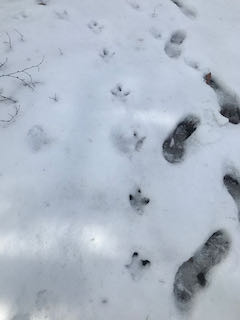Footprints in Winter
Much of the time we are clueless about the marks we make – on the ground, on others’ minds and hearts. Snow is an occasion for looking again. It is a beautiful invitational metaphor for the examined life.
In his Inaugural address, President Biden referred to “this dark winter” — encompassing in this figure of speech “all” of what has become the new ground of our life: a terrifying pandemic that has taken nearly half a million lives, the newly-vivid backdrop of racism in our national lifeblood, and the fearsome foreground presence of fanaticism.
I find myself much occupied with questions of my own footprints — those I’ve set down without much thought, going about my purposes, fulfilling my to-do lists. And I’ve thought a great deal about what footprints I am being called to make now – what new directions, choices, initiatives. No one alive and conscious today in our country would argue against the need for a collective change of course. To do this, each of us needs to examine our personal paths, eliminate what isn’t constructive, and to shift the common good closer to center stage in our priorities than perhaps it has been for some time.
This is deeply personal spiritual work. We are in a time when many solutions will be proposed, many approaches privileged. Movement politics have re-emerged after several generations of sleep to become the essential tools by which many have their voices heard. I am old enough to welcome this important energy, but also to recognize the language of compulsion that can accompany it: we are now “fighting” for various things. We are “disrupting” and “challenging.”
Power doesn’t relinquish without deep sustained pressure. But my own heart leans towards a language of reconciliation and learning, redressing and resolution. How are we to mend?
I find myself very much aware of St. Paul’s wonderful passage about “gifts:”
There are different kinds of spiritual gifts but the same Spirit; there are different forms of service but the same Lord; there are different workings but the same God who produces all of them in everyone. To each individual the manifestation of the Spirit is given for some benefit. To one is given through the Spirit the expression of wisdom; to another the expression of knowledge according to the same Spirit; to another faith by the same Spirit; to another gifts of healing by the one Spirit; to another mighty deeds; to another prophecy; to another discernment of spirits; to another varieties of tongues; to another interpretation of tongues. But one and the same Spirit produces all of these, distributing them individually to each person as he wishes.
And I think, too, of the deep wisdom often associated with Archbishop Oscar Romero. It is a check against the dangers of arrogant self-righteousness, and a certainty that we know what’s best:
It helps, now and then, to step back and take a long view.
The kingdom is not only beyond our efforts, it is even beyond our vision.
We accomplish in our lifetime only a tiny fraction of the magnificent
enterprise that is God’s work. Nothing we do is complete, which is a way of
saying that the Kingdom always lies beyond us.
No statement says all that could be said.
No prayer fully expresses our faith.
No confession brings perfection.
No pastoral visit brings wholeness.
No program accomplishes the Church’s mission.
No set of goals and objectives includes everything.
This is what we are about.
We plant the seeds that one day will grow.
We water seeds already planted, knowing that they hold future promise.
We lay foundations that will need further development.
We provide yeast that produces far beyond our capabilities.
We cannot do everything, and there is a sense of liberation in realizing that.
This enables us to do something, and to do it very well.
It may be incomplete, but it is a beginning, a step along the way, an
opportunity for the Lord’s grace to enter and do the rest.
We may never see the end results, but that is the difference between the master
builder and the worker.
We are workers, not master builders; ministers, not messiahs.
We are prophets of a future not our own.
The image of footprints in the snow offers a cautionary kind of magnificence. Two creatures going about the work they needed to be doing, by their own inner lights, have documented those purposes in the snow. One a man’s, the other a turkey’s. They are obviously moving in opposite directions, and did so at slightly different times. How can we say with any certainty which direction was the “right” one? Or which purpose was superior to the other?
We are workers, and now is a time when we all must work. Perhaps the most important “work” we can do as we begin this new era is to consider the ways in which each of us personally works and serves best. We can’t all be turkeys, nor step into the tracks others have set. We can and must be intentional and self-aware, accepting our individual gifts and graces and limits, as we look for our paths forward through the waning winter towards a new season.





Elizabeth Rhymer
January 24, 2021at11:21 amYes, do what we do best for the greater good even if it doesn’t feel like it will be enough; if we all do this, it will be enough. I often bemoan the fact that I didn’t put in a grape arbor or plant fruit trees or blueberry bushes on our property when we first moved here in 2004. I didn’t because, well, first of all, laziness, and secondly that I might not be around to enjoy them. The problem with that thinking is that why not do something to benefit someone else? Even if I weren’t still living here, it would delight the next family Also, I AM still here and could be enjoying those fruits now. And finally, I still have the same thoughts as I did all those years ago… I won’t be around to enjoy them! But if I had taken action 5 years after we moved, 10 years after we moved, 15 years after we moved, etc. I’d have the fruit now. I mean really…. Get off your butt Elizabeth and DO what you are called to do!
Kathleen Hirsch
January 24, 2021at12:33 pmElizabeth, you have gifts galore…and I love the idea of those berry bushes while you are still a “spring chicken!” If you have a minute, find the cover story in today’s Boston Globe Magazine. It’s on reading levels dipping with COVID. Peace!
Sarah Welsh
January 24, 2021at9:01 amYou leave a powerful, refreshing and welcome Footprint with your written word. Grateful that you share it.
Kathleen Hirsch
January 24, 2021at12:33 pmHow delightful to see your comment, Sarah! Always super pumped to have new friends here!
Nancy Rappaport
January 24, 2021at8:03 amI walked in mount auburn cemetery yesterday and visited Harriet Kezra hunt a woman physician one of the first in Boston who took care of prostitutes and their babies when there was no antibiotics and she has a marble elegant statue made after practicing forty years of medicine and on her gravestone she has the inscription she has done enough. That to me is the challenge knowing how much there is to do and recognizing you give what you can
Kathleen Hirsch
January 24, 2021at12:36 pmYes, yes, yes. We were raised with Everest-high expectations, told we could have it all and do it all and be it all. I heard the most beautiful sentiment from a Buddhist Christian priest friend of mine recently. She is leading a cancer survivor’s “spirituality group.” She said, “I am seeing them realize that once they accept the limitations of their bodies they become completely liberated into a boundless consciousness.” I pray it doesn’t take me to a mortal illness to have this same wisdom.